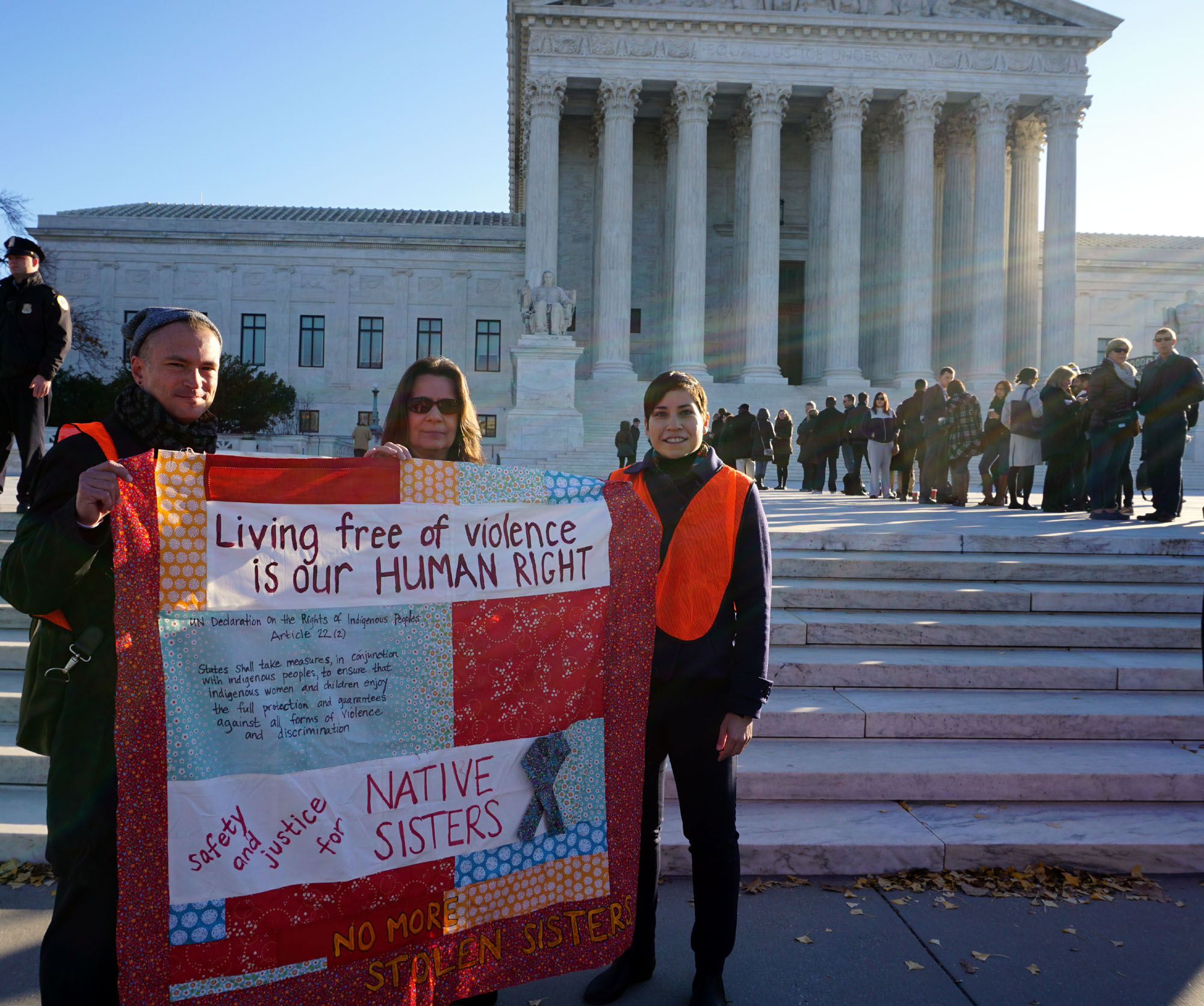Washington, D.C. | On December 7, 2015, the Indian Law Resource Center partnered with the National Indigenous Women's Resource Center (NIWRC), the National Congress of American Indians, the Tulalip Tribes, the Nottawaseppi Huron Band of Potawatomi, FORCE: Upsetting Rape Culture, and the Monument Quilt Project in support of justice and safety for Native women and children and the sovereignty of Indian tribes. Some 300 supporters participated in the Quilt Walk for Justice, which took place on the sidewalk of the United States Supreme Court.
 It was an honor and privilege for the Indian Law Resource Center to assist with this event. Our staff helped with the press and strategic communications for the Walk, and our attorneys spoke at the event and joined the Muskogee Creek Lighthorse Tribal Police Department to serve as marshals for the walk and to provide legal backup. At the start of the Walk, our supporters' collective social media message reached 1.2 million people through Thunderclap, a crowdspeaking platform.
It was an honor and privilege for the Indian Law Resource Center to assist with this event. Our staff helped with the press and strategic communications for the Walk, and our attorneys spoke at the event and joined the Muskogee Creek Lighthorse Tribal Police Department to serve as marshals for the walk and to provide legal backup. At the start of the Walk, our supporters' collective social media message reached 1.2 million people through Thunderclap, a crowdspeaking platform.
The Quilt Walk for Justice took place while the Supreme Court heard oral arguments in Dollar General v. Mississippi Choctaw Band of Indians, No. 13-1496, a case that could have devastating consequences for the safety of Native women and for tribal justice systems throughout the United States.
At issue in Dollar General is whether tribes' retain inherent civil jurisdiction over non-Indian defendants who sexually assault Native women and children on tribal lands. The case arose when the parents of a tribal youth filed a civil suit in tribal court alleging that their child was sexually assaulted twice by a Dollar General store manager. The store is located on tribal lands, and the youth was working there as part of a tribal youth training program. Dollar General sought to avoid any accountability for its employee, arguing that the tribal court should not be permitted to hear the case because it involves a non-Indian defendant. After lower federal courts upheld tribal sovereignty, Dollar General asked the United States Supreme Court to declare that tribes lack civil jurisdiction over non-Indian defendants, even when they are accused of sexual assaults of Native women and children on tribal lands.
 The amicus brief of NIWRC and 105 additional organizations including the Indian Law Resource Center sets out the legal argument explaining the linkage between safety for Native women and children and the sovereign authority of tribal courts to protect them from domestic abusers and sexual predators. Because most tribes generally cannot exercise criminal jurisdiction over non-Indians such a limitation on tribal power could be a dangerous blow to tribal sovereignty. This comes at a time when violence against Native women is at epidemic levels and Native women often never see their abusers prosecuted. A tribe's civil jurisdiction over a non-Indian perpetrator may be the only way a tribe can protect its women and children and offer them meaningful access to justice.
The amicus brief of NIWRC and 105 additional organizations including the Indian Law Resource Center sets out the legal argument explaining the linkage between safety for Native women and children and the sovereign authority of tribal courts to protect them from domestic abusers and sexual predators. Because most tribes generally cannot exercise criminal jurisdiction over non-Indians such a limitation on tribal power could be a dangerous blow to tribal sovereignty. This comes at a time when violence against Native women is at epidemic levels and Native women often never see their abusers prosecuted. A tribe's civil jurisdiction over a non-Indian perpetrator may be the only way a tribe can protect its women and children and offer them meaningful access to justice.
A ruling is expected by the end of June.
Resources
Quilt Walk for Justice Program
Quilt Walk for Justice Press Release
National Indigenous Women's Resource Center Amicus Brief
Transcript of Oral Arguments Before the U.S. Supreme Court
Dollar General Background Materials